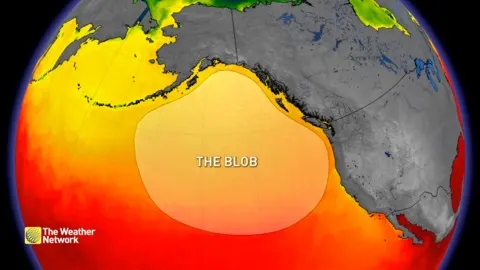
Why 'The Blob' can be a real terror for marine life
Another reason to beware of the blob.
The blob is back -- and no, we aren't talking about the cult classic horror movie. Although this blob can be quite horrific, especially for our marine life.
As The Weather Network’s Kelly Sonnenburg describes, the blob is a warmer-than-normal area of water located in the Pacific Ocean just off the west coast of North America and it can be linked to influencing our weather pattern across North America.
Visit our Complete Guide to Fall 2019 for an in-depth look at the Fall Forecast, tips to plan for it and a sneak peek at the winter ahead
Aside from the impacts that it can have on the weather here on land, it also impacts what is going on under the water in our oceans.
Back in 2015 marine life was impacted greatly by the blob. Everything from plankton to sea lions was suffering. Fisheries had to shut down because adolescent salmon were unable to find nutrients and a lot of them were struggling to survive.
While this current blob might not be as large as the one we saw a few years ago, scientists fear that it could still have dramatic effects on our marine life.
Ocean Wise head veterinarian Dr. Martin Haulena says that the blob can hurt everything from the smallest organism to the largest whale because everything is connected. "Cooler water generally means oxygen. The colder the water, the more oxygen there is and that is really important at a primary level so that algae and other nutrients are able to form and metabolize up the chain, up the ecosystem," he explains.
RELATED: How the blob could impact fall weather
If the water is warmer, nutrients aren't able to form at a basic level and there have been some devastating results because of the blob.
Back in 2015, it wasn't just the salmon that were impacted. Many California sea lions were orphaned because there were just no fish available and so the moms had to travel further and leave their pups for longer to try and find food.
Dr. Haulena says another concern is the competition that the blob causes, "We think about several things happening. Warmer water makes it more difficult for animals native to this area to compete for food because their normal sources have changed. Also, the warmer water might bring species up that wouldn't normally be in this area, and now they have to compete with those species as well."
While Dr. Haulena explains that these are normal events to some extent, he is concerned that the blob keeps coming up more in conversation, "I think the worry here is that we keep hearing this is the warmest water blob or this is the biggest one we have ever had. You keep hearing that more and more frequently so in terms of these instances increasing and the severity of them, well that is worrisome.”
He added that if these trends continue we are going to lose the ability for the ocean to create food, which everything depends on and we could be looking at big ecosystem-wide impacts.
When asked if there is anything we can do, he says that we won't fix the problem by turning off all of our thermostats but it is time to start looking at our actions and seeing if they are contributing to the frequency and intensity of the blob and if so it is time to start making some changes.
